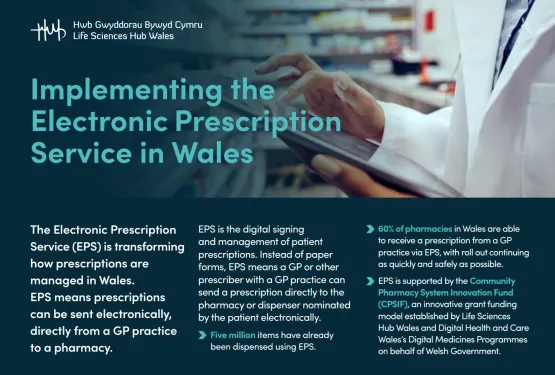How Life Sciences Hub Wales has supported the programme
EPS has been supported by the Community Pharmacy System Innovation Fund (CPSIF), which was established by Life Sciences Hub Wales and the Digital Medicines Programme on behalf of Welsh Government.
CPSIF was created to support the widespread adoption of EPS across community pharmacies through grant funding, playing a pivotal role in enabling system suppliers to become EPS compliant and sending a clear message that NHS Wales wanted to work with suppliers.
The fund was designed to cover the development work required to implement EPS (Tier 1), support innovations towards paperless pharmacy processes (Tier 2), and facilitate integration with the NHS Wales App (Tier 3).
Life Sciences Hub Wales and DHCW have worked closely on this important programme, ensuring the grant management processes are robust and auditable.
Laurence James, Head of Medicines Programmes at DHCW, said:
“The Community Pharmacy System Innovation Fund has been a central component of this programme and has brought in the suppliers. Working with Life Sciences Hub Wales has been extremely positive. We wouldn’t be where we are today without that close working relationship with them.”
As grant administrators, Life Sciences Hub Wales follows a structured and transparent process for assessing, awarding, and managing grant funding to ensure compliance and fairness. Applications are reviewed by an independent panel to determine eligibility and Grant Agreements outline project milestones, ensuring accountability and transparency.
Sarah Clee, Grant Funding Specialist, Life Sciences Hub Wales, said:
“I'm proud of the work we've done on CPSIF. We had an excellent internal audit result, showing that we have the systems in place to manage public funds. But the real success stories are in what DHCW and the suppliers have done to get us to this point.”
Cari-Anne Quinn, Chief Executive Officer, Life Sciences Hub Wales, said:
“At Life Sciences Hub Wales, we’re proud to have worked alongside Digital Health and Care Wales and software suppliers to manage the grant effectively, ensuring funding reaches recipients to continue their invaluable work.”
What next?
In the initial phase, community pharmacy suppliers went through a process of testing and assurance. Now in an implementation phase, the project is focussed on rolling out EPS.
Funding for Tiers 2 and 3 has been extended for a further year (2025), during which time suppliers will work on further innovation by enhancing sustainability and user convenience. This involves implementing a paperless process to reduce the amount of paper printed in pharmacies and working on integration with the NHS Wales App to allow for push notifications to advise patients when their prescriptions are ready for collection.
DHCW is also exploring other opportunities to use EPS, such as in urgent and emergency care settings and hospital outpatient settings.
How can we help?
We’re here to help drive system-wide transformation! If you want to access support similar to that outlined in this case study, we want to hear from you.




